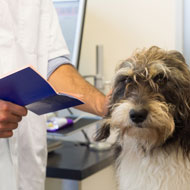‘Tongue worm’ confirmed in imported dog

L serrata, also known as tongue worm, is rare in Europe, but endemic in parts of the Middle East. (Stock photo)
Vets have confirmed a case of Linguatula serrata in a dog imported from a rescue charity in Romania.
One-year-old crossbreed Donna was presented to a practice in February 2017 with a one-week history of coughing, lethargy and inappetence, and a one-day history of vomiting and haemorrhagic diarrhoea. Signs began a week after she was imported from a Romanian rescue centre that was in the midst of a kennel cough outbreak.
Vet Marianne Thomas, of Dog First Aid, reported the case in Vet Record letters this week (27 January, Vol 182 No 4).
Initial treatment involved broad spectrum antibiotics and probiotics for haemorrhagic gastroenteritis and an upper respiratory tract infection. The patient appeared to make a good recovery but the cough and ocular discharge returned three weeks after the first visit. Imidacloprid/moxidectin and a low dose of symptomatic meloxicam were administered to keep her comfortable and cover any parasitic risk.
Twenty-four to 48 hours after treatment, the dog coughed up a dead worm, which was later confirmed as L serrata. A second dead worm was coughed up a week later.
Endoscopy found no adult worms in the airways, a nasal swab showed no L serrata eggs and monthly faecal samples for six months returned negative results. The patient was declared free from L serrata in October 2017.
L serrata, also known as tongue worm, is rare in Europe, but endemic in parts of the Middle East. Studies have shown a prevalence of 60-70 per cent in stray dogs in parts of Iran. Several cases have so far been reported in dogs imported from Romania. The worm is zoonotic, but few cases have been reported in people in Europe.
Clinical signs in dogs include: purulent nasal discharge, epistaxis, sneezing, coughing, lethargy, dyspnoea due to obstruction (very rare) and an increase upper respiratory noise. According to Dr Thomas, described treatments include nasal flushing with warm saline for diagnosis and possible detachment; surgical removal (but this can cause significant tissue damage and may be impossible if worms are in the sinuses); milbemycin oxide; or macrocyclic lactones.
Dr Thomas concluded: ‘It is recommended dogs from high risk areas be closely monitored for signs. Screening of dogs with relevant clinical signs would be prudent. Prophylactic treatment with a suitable anthelmintic before travel from the country of origin may also be beneficial.’



 The Veterinary Medicines Directorate (VMD) is inviting applications from veterinary students to attend a one-week extramural studies (EMS) placement in July 2026.
The Veterinary Medicines Directorate (VMD) is inviting applications from veterinary students to attend a one-week extramural studies (EMS) placement in July 2026.